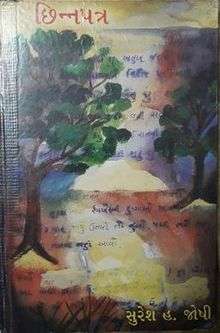Chhinnapatra
 Cover page | |
| Author | Suresh Joshi |
|---|---|
| Original title | છિન્નપત્ર |
| Translator | Tridip Suhrud |
| Cover artist | Bhupen Khakhar |
| Country | India |
| Language | Gujarati |
| Genre | Lyrical novel |
| Publisher | Parshva Publication (Gujarati ed.), Macmillan India (English ed.) |
Publication date | 1965 |
Published in English | 1998 |
| Media type | |
| Pages |
122 pages (Gujarati ed.) |
| ISBN | 978-0-333-93188-2 Eng. ed. |
| OCLC | 41532391 |
| 891.473 | |
| LC Class | PK1859.J593 |
| Followed by | Maranottar (1973) |
Chhinnapatra (![]()
Background
Joshi published Chhinnnapatra in 1965. In its wake, Shrikant Shah, Madhu Rye, Chandrakant Bakshi, Radheshyam Sharma and Mukund Parikh published their experimental novels Asti (1966), Chahera (1966), Paralysis (1967), Fero (1968) and Mahabhinishkraman (1968) respectively.[1] The first edition of the novel was published with the subtitle 'a rough draft of an intended novel' but it was dropped from the second edition.[2]
Synopsis
Ajay, the main character, is a creative writer and loves Mala; but Mala's friend Lila loves Ajay. There are other young men Amal, Arun, Ashok aspiring for the hands of Mala. After the death of Ajay, Mala found a diary written by Ajay. Mala passed through the diary during the train journey.
The novel is divided into two sections, the first contains the diary of Ajay and it is in the first person narration while the second part is an epilogue with omniscient point of view. Thus the two sections are written from two different point of view.[2]
Theme
Chhinnapatra literally means the "torn pages" or the "tattered letter" in Gujarati. As the title indicates, this is a collection of the torn pages of a scrapbook. Contains fifty pages, the scrapbook belongs to Ajay who has written it. The inner reality of his being is presented here through his understanding of himself, his love for Mala, and a few other persons. The complexity of his love, the nuances of his emotion, the pangs of his agony are all depicted here with the help of images and symbols. The appendix of scrapbook explains past as a flashback and ends novel.[3]
Criticism
Joshi has himself considered it as a "a draft of novel" instead of novel. So it rejects conventional canon of novel writing. Two of the critics have said that the depiction of the characters in this novel is 'phenomenological'.[3] Shirish Panchal wrote that, among Joshi's longer works of fiction Chhinnapatra deserves a special mention.[2] Aniruddh Brahmabhatt wrote that, this type of modern novel has negated the age old concept that a novel can't survive out of its social milieu.[4] K. M. George considers it as an intended anti-novel which ended up only as an experiment difficult to read or comprehend.[5]
Translation
It is translated into English as Crumpled Letter by Tridip Suhrud in 1998.[6]
References
- ↑ The Illustrated Weekly of India. 101. Times of India. 1980.
- 1 2 3 Panchal, Shirish (2004). Suresh Joshi. New Delhi: Sahitya Akademi. pp. 40–44. ISBN 978-81-260-1922-9. Retrieved 27 January 2017.
- 1 2 P. K. Rajan (1989). The Growth of the Novel in India, 1950-1980. New Delhi: Abhinav Publications. pp. 72–73. ISBN 978-81-7017-259-8. Retrieved 27 January 2017.
- ↑ Parekh, Dhwanil (September–October 2012). "અનિરુદ્ધ બ્રહ્મભટ્ટ કૃત 'અન્વીક્ષા'- એક અભ્યાસ". Sahityasetu: A literary e-journal (5). ISSN 2249-2372. Retrieved 27 January 2017.
- ↑ K. M. George (1992). Modern Indian Literature, an Anthology: Surveys and poems. Sahitya Akademi. p. 141. ISBN 978-81-7201-324-0.
- ↑ Margaretta Jolly (4 December 2013). Encyclopedia of Life Writing: Autobiographical and Biographical Forms. London: Fitzroy Dearborn Publishers. p. 1087. ISBN 978-1-136-78744-7. Retrieved 27 January 2017.
External links
- Chhinnapatra at Ekatra Foundation
- Chhinnapatra at Google Books
- Crumpled Letter at Goodreads